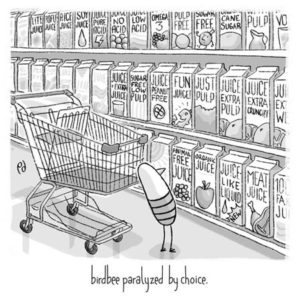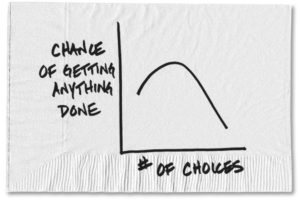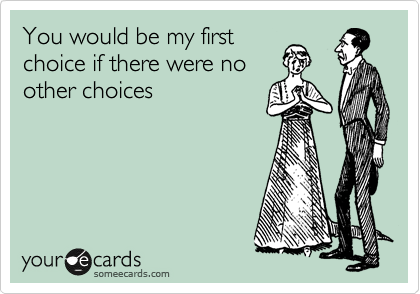
Having lots of choices can be a blessing or a burden, depending on your ability to make decisions. If you find yourself struggling when you have too many choices, these four steps will help you make choices that are most aligned with your truth. (Estimated reading time: 6 minutes)
“May your choices reflect your hopes, not your fears.”
— Nelson Mandela
As long as you’re alive, you’ll be faced with choices every single day of your life.
What should I eat for dinner? How should I decorate my room? Is this outfit appropriate for my office cocktail event? Should I go the mall or clean the house this Sunday?
Those decisions are relatively simple compared to the bigger ones.
Is this the man/woman I would like to spend the rest of my life with? Should I invest in my dream business? Which university would be a good fit for me? Where would be an ideal place to relocate to?
Each and every day, we get the opportunity to exercise our decision-making muscles.
Some people have no problem with having a lot of choices. In fact, studies have shown that these types of individuals thrive in such circumstances and end up doing and feeling better.
According to psychologist Barry Schwartz, who wrote The Paradox of Choice, choice can be good sometimes, but most people find the amount of options available nowadays to be overwhelming.
When we’re unable to efficiently handle too many choices, it can paralyze us and slow down our productivity and progress. Schwartz says that increased choices can actually make us miserable because of our tendency to experience regret, self-blame, opportunity costs and an escalation in expectations.

For the majority of us, having too many choices is stressful and causes “decision fatigue”, a condition that saps our vitality and happiness. When you combine all this choice with unreasonably high standards, a person can be prone to prolonged sadness and depression.
Yet as challenging as choices can be, we have to appreciate the fact that our ancestors didn’t many in the past. They were restricted to little or no options and were deprived of the freedom to choose.
When we look at it from this perspective, we should feel lucky to have the liberty to create our lives based on who we are and who we would like to become in the future.
With the advent of the age of scientific discovery and innovation, there was a boom in every industry and all of a sudden, we were inundated with choices. Our progressive attitude allowed people to break out of the traditional mold and choose their own path.
Women who could only be homemakers can now choose any role they desire, such as the president of a country or a NASA scientist or a doctor.
Having lots of choices is something that we should be grateful for but we need to develop the capacity to handle them. The information that’s available about options could potentially be too much for us to digest. It can make the decision-making process overly complex and frustrating for us.
Just open any fashion magazine and you’ll see how the editors overcrowd it with ads. The dating apps that provide dating options with just one click, confuse singles and make it tougher for them to figure out who’s right for them. Without the right decision-making tools and self-awareness, we’ll face the conundrum of choosing an option that most aligned with us.

In his book, The Seat of the Soul, author Gary Zukav writes, “The center of the evolutionary process is choice. It is the engine of our evolution. Behind every choice, there is a corresponding intention. Our intention is what creates the energy in whatever water shows up for us once we take action. Each choice that you make is a choice of intention.”
According to Zukav, you can’t choose your intentions consciously until you become aware of the different aspects of your personality. If you aren’t conscious of yourself, no matter how much you want your life to move in a specific direction, you’ll find that it ends up moving in another.
That’s why a well-rounded and balanced decision-making process requires a combination of rational decision making and and intuitive instincts.
We also need to change our attitude by getting comfortable with the idea of ‘good enough’. Even though the Internet gives us the ability to research endlessly, we need to limit our options so that we can avoid spending too much time and energy deliberating about them.
This tactic can be applied to dating and marriage as well. Lori Gottlieb who wrote Marry Him: The Case for Settling for Mr. Good Enough stated that too many women focus on the question “Have I found the right one? And is this the best I can do?” instead of an insightful question such as “Am I happy?”

With dedication and practice, we can get better at making choices that are aligned with our truth and move us closer towards our goals and vision.
Here are four steps to dealing with too many choices:
1. Evaluate your choices wisely: Part of the problem lies in the sheer number of choices that we face every day. We need to be selective and focus our time and energy only on those choices that really matter, while avoiding the less meaningful ones that deplete us. After choosing which decisions to focus on and limiting your options within those decisions, the next step is to evaluate each option. Write down the pros and cons of each one in detail. I find that getting my thoughts out of my head and onto paper makes the process more tangible and real. When clearly expressed, a typically jumbled-up web of thoughts takes on more order and structure.
2. Review your values and intention: This is the part where you shift from rational thinking mode to heart mode. Ultimately, it’s your intention that influences your outcomes, therefore it’s crucial that you’re clear about what you want. Ask yourself: do my choices reflect on my intention to honor my values and purpose, my relationships and my soul’s desires? When you have clarity about what you want, your values and personal vision will be the compass that will point you in the direction you need to go in.
3. Center yourself: We seldom make good decisions when we’re in a state of anxiety, worry and desperation. The quality of consciousness that you bring when evaluating each choice affects every ensuing action and thought. When we cling on to our choices, it inevitably leads to stress, bad decisions, dissatisfaction and even depression. Also, when we’re tired or stressed, we try to conserve our mental energy by making choice based on only one or two factors, and leaving out all the other significant determinants that go into making the best decision. The solution is to calm your nervous system and basically ‘chill out’ when making choices, especially the important ones. Engage in activities that get you centered, such as meditation, nature walks, exercise, yoga, listening to music, painting or any other hobby that induces a state of peace and flow.
4. Avoid “Buyer’s remorse”: Buyer’s remorse is a term used to describe the sense of regret a person feels after making a purchase – mostly after an impulsive or expensive one. This sentiment is similar to what one may feel after choosing one option out of many desirable choices. It’s at this juncture that we’re tempted to consider the hypothetical trade-offs and the missed opportunities instead of the potential opportunities. Commit to your choices and train yourself to see the beauty and potential for growth in your current circumstances and you’ll be amazed at what could blossom.
Our journey is ultimately about creating a life that we love and that will leave us with no regrets. Our choices are a reflection of the essence of who we are, and we should use them as an instrument to demonstrate our personal power and the legacy that we would like to leave behind.
All the my best on your journey,
Seline

Question for you: What do you do when you have too many choices? What’s your favorite go-to technique to simplify the process?
Did you like this post? Sign up below and I’ll send you more awesome posts like this every week.

Hi there, after reading this awesome paragraph i am ttoo glad
to share my experience here with friends.